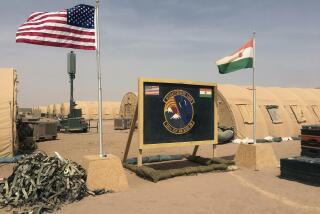Airport Is on U.S. Hand-Over List
- Share via
BAGHDAD — The American military will hand over partial control of Baghdad international airport to the interim Iraqi government June 30, with the rest of the facility expected to be turned over by mid-August, officials with the U.S.-led civilian administration here said Wednesday.
The hand-over of the airport, which has been held by the military since the final days of the war that toppled President Saddam Hussein’s regime in April 2003, will restore Iraqi control over a potent symbol of sovereignty and pride. The move could help clear the way for a resumption of regular commercial passenger flights into Baghdad, though security remains a major concern.
The military will relinquish a large portion of the airport, including a runway and the main terminal building, when the Coalition Provisional Authority hands over sovereignty to the Iraqi government in two weeks, said a coalition advisor to the Iraqi Ministry of Transportation, speaking to reporters here on condition of anonymity. The rest of the facility is scheduled to be turned over in two months.
“We could have commercial operations tomorrow,” he said. “The reason we don’t ... is the security situation outside.”
The advisor said that no date had been set for regular passenger service to resume, and that the decision would be up to the Transportation Ministry and hinge largely on security concerns. The airport, about 10 miles from central Baghdad and formerly known as Saddam International Airport, has been used primarily by the U.S. military for the last 14 months.
A senior military operations officer, also speaking on condition of anonymity, said an estimated 500 flights a day land at the airport -- all but 50 of which are military. They include a special Royal Jordanian Airlines passenger charter for the coalition authority and commercial flights such as those for international courier services.
One such flight, a cargo plane belonging to the international delivery company DHL, was forced to turn back to Baghdad in November after being struck by a missile shortly after takeoff. There were no injuries.
“There’s no way to quantify how safe it is,” the military operations officer said. “There’s capabilities out there against aircraft.... Air carriers have to take that into account.”
He said it had been months since the last reported attack on a civilian aircraft at the airport, but he would not comment on any recent assaults on military flights.
Adding to security problems, the road from Baghdad to the airport is considered one of the most dangerous in the country. It has been the site of numerous ambushes, especially of sport utility vehicles ferrying coalition contractors.
After the final hand-over, the airport will witness “very, very limited use” by military flights, which will be used in support of the new U.S. Embassy, the operations officer said.
The military will use other airports, presumably at former Iraqi air force bases such as one near Balad, about 50 miles north of the capital, and at Asad, in western Iraq. Both bases house major American installations.
Camp Victory, a massive U.S. base adjacent to the Baghdad airport, will receive supplies over land -- something the operations officer described as a “sacrifice” but indicative of the military’s desire to pass a valuable national symbol into Iraqi hands.
The airport also has housed a special prison for top officials in Hussein’s regime, including most of the U.S. military’s “deck of cards” list of most-wanted officials. The operations officer said the prisoners would be moved to another facility.
The coalition transportation advisor predicted that interest would run high among commercial carriers to resume Baghdad flights. Last summer, he said, officials solicited feelers from international air carriers. A plan to restore commercial service then was shelved for security reasons, but not before the coalition authority received statements of interest from 31 carriers, including Lufthansa and British Airways. “I think there is absolutely a demand, and there is a market,” the advisor said.
Until August, American soldiers will continue to play a role in airport security. After that, private contractors and a special Ministry of Transportation security force will handle the job.
The ministry has been transferred to full Iraqi control, as have 14 other government ministries. “As the coalition’s role in governance and operations management decreases, the amount of Iraq’s authority over its own affairs increases,” coalition spokesman Dan Senor said Tuesday.
Many of the coalition officials who have in effect run the ministries will move into consulting positions, although the U.S. Embassy is expected to retain some measure of influence through its management of $18.4 billion in reconstruction funds.
More to Read
Sign up for Essential California
The most important California stories and recommendations in your inbox every morning.
You may occasionally receive promotional content from the Los Angeles Times.










